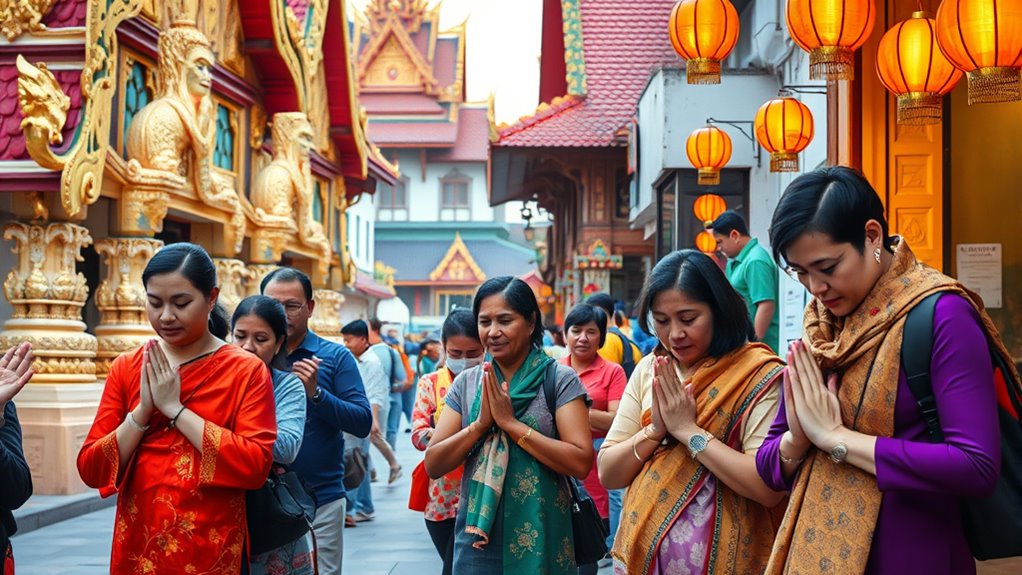When traveling abroad, it’s vital to observe local customs and body language, like avoiding offensive gestures, using proper eye contact, and understanding gift-giving traditions. Respect cultural values by paying attention to how locals communicate and prefer their gestures and norms. Keep gifts simple and culturally appropriate, and always be mindful of presentation and timing. Staying aware of these nuances helps you build respectful relationships. If you want to master these tips, there’s much more to discover.
Key Takeaways
- Observe and mimic local gestures and body language to show respect and avoid misunderstandings.
- Learn gift-giving customs, including proper presentation and timing, to demonstrate thoughtfulness.
- Respect cultural norms around eye contact, personal space, and physical contact to foster positive interactions.
- Understand specific taboos, such as giving certain items or using particular gestures, to prevent offense.
- When unsure, keep gestures simple, neutral, and polite to adapt smoothly to unfamiliar cultural settings.

Understanding cultural etiquette is essential when you travel or interact with people from different backgrounds, as it helps you show respect and build genuine connections. One of the key elements to ponder is gestural communication. Gestures can vary widely from one country to another, and what’s acceptable in your culture might be offensive elsewhere. For example, a thumbs-up might be a positive gesture in many places but could be disrespectful in others. Similarly, pointing with your index finger or crossing your legs in a certain way can carry unintended meanings. To avoid misunderstandings, observe how locals communicate through gestures and adapt accordingly. Pay attention to subtle cues, and when in doubt, keep your gestures simple and neutral. This shows respect for their customs and helps prevent accidental offense. Additionally, understanding the Bedroom environment can give insights into personal space and comfort levels, which vary across cultures.
Another critical aspect involves gift giving customs. What’s considered a thoughtful gesture in your country might be inappropriate or even insulting abroad. Some cultures place great importance on the type of gift, the timing of giving it, and how it’s presented. For instance, in Japan, presenting a gift with both hands is a sign of respect, and wrapping it neatly is just as important as the gift itself. In contrast, offering a gift with the left hand might be seen as disrespectful in certain parts of the Middle East. Certain items, like clocks or sharp objects, can carry negative connotations in some cultures, so it’s wise to research what’s appropriate before offering a gift. Additionally, in some countries, refusing a gift initially is polite, as it’s common to insist a little before accepting. Understanding these gift giving customs demonstrates your thoughtfulness and helps foster positive relationships.
It’s equally important to recognize that gestures and gift customs are deeply rooted in cultural values. What seems trivial to you may hold significant meaning to others. For example, making direct eye contact can be seen as confident and honest in some cultures, but as aggressive or rude in others. Similarly, the way you accept or refuse a gift or handshake can convey respect or disrespect. Being aware of these nuances helps you avoid awkward situations and shows your genuine interest in respecting local traditions.
Frequently Asked Questions
How Do I Apologize if I Accidentally Offend Someone Abroad?
When you accidentally offend someone abroad, it’s important to follow proper apology etiquette and show cultural sensitivity. You should sincerely express your regret, using respectful language and a humble tone. Acknowledge the mistake without making excuses, and listen carefully to their feelings. Your genuine effort to understand and apologize demonstrates your respect for their culture, helping to rebuild trust and prevent further misunderstandings.
Are There Universal Gestures I Should Avoid in All Countries?
You might think some gestures are harmless, but universal gestures can cause chaos if you’re not careful. Avoid flashing the thumbs-up, the OK sign, or pointing with your finger—they’re cultural taboos in many countries. These gestures, seemingly innocent, can offend or provoke misunderstandings. To stay respectful, learn specific cultural taboos and universal gestures to avoid. When in doubt, a simple nod or smile beats risking an unintentional insult.
What’s the Best Way to Learn Local Customs Quickly?
To learn local customs quickly, immerse yourself in cultural experiences actively. Attend local workshops and community events to gain firsthand knowledge. Talk to residents and observe their behavior openly to pick up on subtle cues. Be respectful, ask questions politely, and show genuine interest. This hands-on approach fosters cultural immersion, helping you adapt faster and avoid unintentional faux pas, making your travel experience richer and more respectful.
How Do I Handle Language Barriers Politely?
Imagine standing in a bustling market, trying to ask for directions but feeling lost in translation. To handle language barriers politely, rely on language translation apps and embrace non-verbal communication—smiles, gestures, and nods. These tools bridge gaps, showing your respect and patience. Keep your tone friendly and open, and remember, often a simple gesture can convey more than words, making your interactions smoother and more genuine.
When Is It Appropriate to Tip in Different Cultures?
You should always be aware of tipping customs to show respect for local cultural sensitivities. In some countries, tipping is expected and appreciated, while in others, it might be considered rude or unnecessary. Research ahead of time or ask locals to understand when it’s appropriate to tip. By doing so, you demonstrate cultural awareness and guarantee your gestures are welcomed, avoiding any unintentional offense.
Conclusion
Remember, when traveling abroad, respecting local customs shows your appreciation and openness. Be observant and adapt quickly, because “When in Rome, do as the Romans do.” By following these simple do’s and don’ts, you’ll avoid misunderstandings and make genuine connections. Embrace the differences with an open mind, and your cultural experiences will become richer and more rewarding. Stay respectful and curious—it’s the key to truly appreciating every new place you visit.









